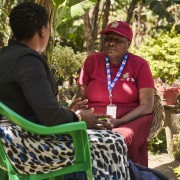Speeches Shim
USAID Boresha Afya ("Improve Health") – Southern Zone program works to address health service gaps across the regions of Iringa, Njombe, Morogoro, Lindi, Mtwara, and Ruvuma. The program utilizes a client-centered approach to deliver services in geographic areas with high prevalence of HIV, TB, Malaria, and unmet needs for family planning and maternal/child health services.

Resilient and grateful is how Shole, a mother of two in the Arusha region of Tanzania, describes herself. She is also HIV-positive. “I discovered I was positive in 2012 while pregnant with my third child,” she explained. “I was devastated to receive my results. I shared the news with my husband who didn’t take it very well. He decided to leave me and my children without any support. However, I delivered the [third] child safely. Sadly, after six months, my baby died.”
The public and private sectors play a significant role in driving Tanzania’s economic development and growth. As the economy and labor force evolve, the U.S. Government recognizes there are opportunities to stimulate inclusive, broad-based economic growth through support to these sectors.
The USAID Social Enterprise Activity (USESA) works to improve the health status and sustain economic growth in Tanzania by preventing the spread of disease (particularly HIV/AIDS) and unwanted pregnancies.
The Sauti Yetu ‘Our Voice’ program seeks to engage people living with HIV in the response to HIV in Tanzania through the National Council of People Living with HIV in Tanzania (NACOPHA). The program focuses on increasing HIV testing services through referrals and linkages to health services, as well as retention and adherence to antiretroviral treatment (ART). Sauti Yetu engages HIV-positive individuals and groups in service delivery.


Comment
Make a general inquiry or suggest an improvement.